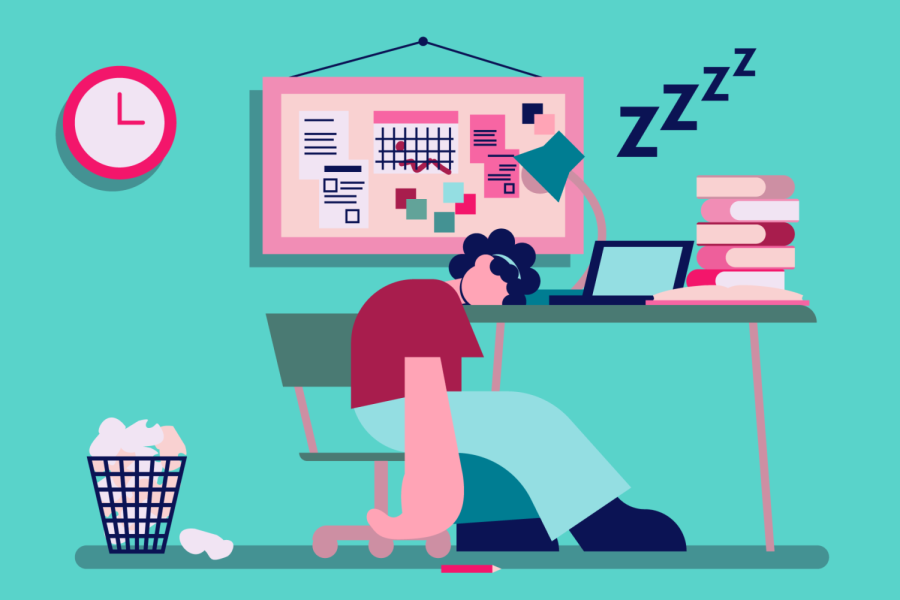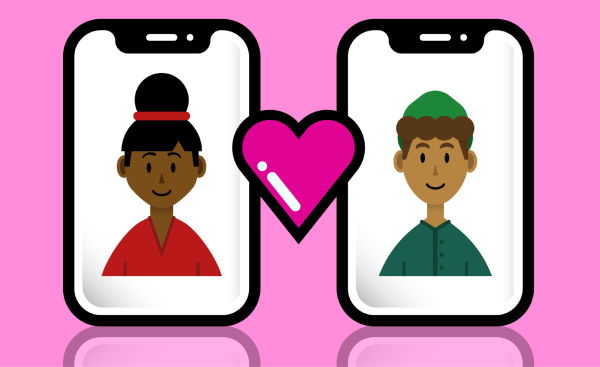‘The best time to start studying is yesterday’
Study advice, resources and tips for overcoming boredom and drowsiness
Illustration by Teresa Aguilera, OMN Illustrator
Studying requires proper energy and a proper mindset in order to avoid dozing off. This illustration depicts a student that has fallen asleep during a studying session.
June 1, 2022
A lack of energy or a loss of interest in the midst of studying a large amount of course material can lead us to doze off. How can we tackle this?
Many of us have succumbed to drowsiness while studying. When you believe you’re going to be able to remain awake, your eyelids start to droop, your neck relaxes, and you fall asleep. It happens for many reasons, one being when we lose interest yet fight to keep moving forward with our study session. It happens to the best of us!
Having a better study environment with high enthusiasm and encouragement before beginning your lengthy period of study is the main key to staying motivated.
“For me, the ideal study environment is one where I can be relaxed and it is quiet,” said Michael W. Burand, Ph.D., a senior instructor in the chemistry department at Oregon State University. “Sometimes, music or some background noise is okay, but if I really need to concentrate, it needs to be silent and free of distractions.”
Shaurya Gaur, a third-year student studying computer science at OSU, said the library is a really good study space for him. He said he likes to get a big table with his friends as they study on their own, find a spot with a whiteboard when he’s working on math problems or find a small closed-off desk when he has to write an essay he has been putting off.
“I think the ideal study environment is a clean desk or table, free from distractions,” said Cassandra Siler, Ph.D., a chemistry professor at OSU. “As a student, I used to enjoy finding a quiet place in the library to really focus. There is evidence that students benefit from switching up their study environment, too, so don’t hesitate to try out something new!”
Knowing when it is the optimal time to focus on exam preparation and how frequently you should study is important.
“I joke with students that the best time to start studying is yesterday, and the second best time is today,” Burand said. “Studying well in advance, even if it is only for a few minutes a day, can make a huge difference. Studying smaller amounts more often also helps to make the material more digestible.”
Gaur said he studies a few days before an exam, as he finds that working on assignments can be good studying in itself.
“The best time depends on the individual,” Siler said. “Some people study better in the morning, some during the day, and some at night. But once you experiment a little and get to know when you study effectively, then you should block out smaller chunks of time during that time of day to space out your studying. I think it’s fine to focus your studying mostly on a single course for a couple of days before the exam, but really you should be thinking about the exam more like a week ahead of time to start preparing more slowly.”
Not many students know just how important it is to have the ideal strategies for studying in order to retain all the course material.
“It is important to study effectively,” Burand said. “True, what works best for some students may not be ideal for others, but there are general study habits that work well for almost everyone, such as focused studying early and often.”
According to Gaur, he spends most of his time on work and projects, and he studies only a few days before an exam. His to-do list and calendar are the most important things that help him manage his time, he explained.
“When every term starts, I go to the course calendars and put down every assignment I can,” Gaur recommended. “This lets me manage my time early. Find a system that works for you.”
If Gaur is not feeling prepared, such as when it is a hard course, he said he will dedicate a lot more of his time to studying to ensure he can pass his test.
“Do the course reading ahead of time, take notes in lecture, and then review and/or rewrite your notes either later that day or the next day,” Siler said. “This really helps solidify what you did in lecture. Then work on your homework throughout the week and not just the night of the deadline. This allows for time to ask questions in class or in office hours.”
Burand does not recommend studying all night before an exam day, as “cramming” isn’t really effective.
“No! There may be rare exceptions, but for most people it does not work well to study this way” Burand said. “And doing just about anything after a night of no sleep is difficult, especially taking an exam that requires intense focus.”
Gaur said, surprisingly, that he has become an early sleeper, so he never pulls all-nighters to prepare for a single exam. Although, that might be a different conversation for a lot of other college students.
“I don’t recommend staying up all night,” Siler said. “While ‘cramming’ may help for one exam to a certain extent, I definitely don’t recommend studying all night. You need to be sharp for the exam, so sleep is important! I once had a teacher tell me that sleep two nights before an event is also important, so guard your sleep that night, too.”
In addition to getting a good night’s sleep, weekends are just as important in maintaining a healthy personal life, Gaur points out.
“Over the past few years, I’ve really worked on work-life balance,” Gaur said. “I find that setting a few times every week to be ‘no work’—like Friday and Saturday evenings—motivates me to get stuff done earlier and keeps me socially and mentally healthy. Weekends are critical.”
Studying large materials of a single course can be very exhausting at times and can drive our minds to fall asleep in the middle of studying.
“If you lose focus while studying, it likely means there are either too many distractions or that you have been studying too long and should take a break,” Burand said. “More frequent, shorter study sessions are far better than marathon study sessions.”
To manage the stamina and ability to study without getting fatigued, caffeine and sugar have helped Gaur to stay awake while studying. He also said he likes breaking up the work into more digestible tasks, so once he has done those, he can take a quick break and walk around the library.
“Talk through the material with a friend, get up and take a walk, take a break to eat,” Siler suggested, adding that someone once told her to drink a coffee and then take a quick nap. “When you wake up, the coffee will have kicked in, plus you will have had a little sleep! I’m not great at taking naps, so I haven’t tried it, but it seems like a good strategy.”
Sometimes, if you start to feel tired while studying, it might just be because you’re bored.
“If you’re bored, it probably means it is time to take a break,” Burand said. “And I have found it is most effective to simply get away from distractions. For example, when I really need to focus on something, I’ll go to a quiet place and leave my phone where I can’t access it, like in another room; otherwise, it can be too tempting to check it and get distracted from what I’m trying to do. I believe the adage that interest is the best teacher. Finding aspects of a course that interest you can help motivate you to learn more, and when you become truly interested it will no longer feel like studying. It can also help to study with other students who are interested and excited about the course.”
Speaking of study partners, on one hand, Burand pointed out that if your study companion is serious, committed and has learning goals that are well-aligned with your own, it can really help. On the other hand, if not, it’s better to seek out help from someone else such as a [teaching assistant], peer tutor or the course instructor.
For Gaur, to maintain his focus and concentration while studying, he listens to music, especially electronic or orchestral music. Gaur’s personal favorite albums for studying include Daft Punk’s Alive 2007, and the soundtracks for Tenet and TRON: Legacy.
According to Siler, one thing that might be helpful when you start to get bored is to keep in mind why you’re doing what you’re doing.
“What are your short and long term goals?” Siler said. “Are you working toward a particular grade, your degree, your dream job? When you’re feeling distracted, try to remember that you’re doing this for a reason. Getting your mind and body in a good place can be helpful. Make sure you’ve eaten something with protein in it, maybe do a quick workout to get your blood flowing (or just run around outside for a couple of minutes), and remind yourself why you’re here and what your goals are. Visualize how great you’re going to feel when you achieve your goals.”
For working college students, it can be hard to find the time, energy and mental capacity to study outside of work and class, while also setting boundaries and making time for yourself.
“Working part or full time can add a significant challenge for students,” Burand said. “I encourage you to start studying as early as possible and schedule specific times to study so you can use your time most effectively. This is sound advice even if you’re not working. One of the great things about OSU is all the support in place to help students. I always encourage students to reach out early for help finding the right study resources. This will help prevent stress later.”
Similarly, Siler recommends making a weekly schedule to find where your good study times are and then sticking to them, noting that there’s a great template on the Academic Success Center website.
Balancing your study time with different activities will help you organize your time without feeling burnout. Adopting the most effective study techniques will impact your success, including having enough sleep and staying hydrated during the lengthy period of study.
“Make a plan and set measurable goals!” Burand said. “I often hear students say things like, ‘I’m going to study hard.’ But what does that mean, really? If you study for one hour, did you study hard? Two hours? You don’t know, because you didn’t set a measurable goal. It is far better to say something like, ‘I’m going to do end-of-chapter practice problems from 5 to 5:45 [p.m.] every weekday from now until the exam.’ Now you have a definite daily start time, and after 45 minutes you’ll have met your goal. If you want to study more after that, great. But if not, you still have the knowledge that you’ve followed your plan and met your daily goal, and you’re on track to succeed. Good luck and happy studying!’
Resources for studying tools and tips, scheduling, email formatting and more can be found on the Academic Success Center website.



















